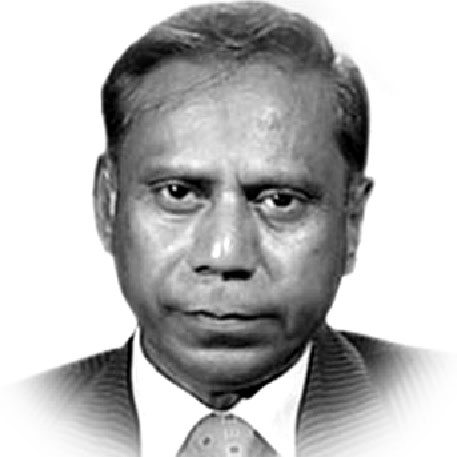Sultan M Hali
HISTORY of any conflict is normally inscribed by the victor while truth is the first casualty in the fog of war. Similarly, several myths and shibboleth spread by India, the vanquisher in the 1971 Pak-India War have come to be accepted as facts. The first hyperbole is India’s rationale for its assault on Pakistan. General election of 1970 and the delay by the military government in the transfer of power to the elected representatives was part of an internal democratic process and should not have been used as a pretext for India’s naked aggression to dismember Pakistan. The seeds of the secession of East Pakistan however, were laid nearly a decade earlier. Sheikh Mujibur Rahman, the so-called founder of Bangladesh had been surreptitiously visiting the Indian border town of Agartala to meet Indian co-conspirators. One such sojourn on 5 February 1962, corroborated by a diary note endorsed by Khowai SDO Smarajit Chakravarty, has belatedly been exposed by Manas Pal, in his Op-Ed titled ‘A Diary Note On Mujibur Rahman’’, published in Agartala’s daily Bengal Newz of 5 November 2012.
A fable prevails that Sheikh Mujib, despite securing maximum seats in the 1970 elections was denied power by conniving West Pakistani politicians. The truth can be gauged from APP correspondents interviewing Sheikh Mujib in Dhaka post elections, congratulating him on his victory they inquired of the Sheikh’s future plans after he would assume the mantle of premiership of Pakistan. His response was that he would rather be the “Father of a Nation (Bangladesh)” than just a Prime Minister of Pakistan. As far as the role of the politicians of West Pakistan is concerned, it is true that some West Pakistani politicians were keen that power may not be handed to Sheikh Mujib so that they could rule Pakistan. However, the ultimate authority lay with the military dictator of that time, General Yahya Khan, who decided not to invite Sheikh Mujib to form the government. Some analysts argue that if Sheikh Mujib had been asked to head the government, perhaps the magnitude of responsibility may have motivated him to stop the severance of East Pakistan.
Indian involvement in the dismemberment of Pakistan was at various levels. Its Parliament approved the support for Bengali insurgents while its military and intelligence clandestinely trained Mukti Bahini insurgents well before the 1971 war. Indian drama of hijacking and destroying its own Fokker aircraft “Ganga” at Lahore on 30 January 1971 was a ruse to deny over-flight rights to Pakistani aircraft so that no logistic support could be provided to the troops stranded in East Pakistan. Sheikh Mujib declared 23 March 1971 as “Black Day” instead of Pakistan Day and occupied government buildings and hoisted the Bangladesh flag. Rebellion by Bengali officers and men, massacre of Pakistani troops and non-Bengalis commenced and forced the hands of the government to take the army action on 25 March 1971. The insurgency operations gradually grew in intensity and the Mukti Bahini got bolder while the Pak Army in the East became demoralized due to the onslaught. It got so widely dispersed and stretched in trying to contain the ‘Mukti Bahini’ that when the Indian Army launched its operations on 22 November 1971, beleaguered and handicapped by shortage of weapons and provisions, its operations were badly hampered.
Pakistan Army, though heavily outnumbered, with 34, 000 troops combating 5,00,000 Indian troops and 2,00,000 Mukti Bahini guerrillas; one squadron of fighter aircraft facing eleven squadrons of the Indian Air Force and a handful of naval vessels, which were blockaded by the Indian flotilla, fought gallantly. Indian Army Chief, General S. H. F. J. Manekshaw while talking to the Indian Express on 01 February 1972, during a lunch reception by the Press Association in honour of the three Services Chiefs stated: “. . . an impression has been created that the Pakistanis had not fought well. They fought extremely well, if they had not, India would not have suffered heavy casualties.” Another false propagation by India is that 93,000 Pakistan Army troops surrendered in 1971. In reality, there were never more than 34,000 troops in East Pakistan. The figure of 93,000 includes police, paramilitary and pro-Pakistan civilian population.
It has been widely proliferated that Pakistan Army killed over 3 million people in military action, and they all were innocent civilians. This baseless Indian and Awami League propaganda has been belied by independent researchers like Sarmila Bose, in her book Dead Reckoning, quoting Home Ministry of Bangladesh in 1972 that there were reports of only about 2,000 complaints of death due to military actions while the Mukti Bahini slaughtered thousands of Pakistani troops and non-Bengali civilians. Unfortunately, apparently with the backing of India, Awami League is still pursuing alleged war crimes. On one hand it is seeking an apology from Pakistan Army for its supposed genocide of Bengalis while on the other, it is persecuting and meting death sentence to the so-called collaborators of Pakistan in 1971. In its obsession to pursue its whims, a Bangladesh court has found an award-winning British journalist David Bergman guilty of contempt for questioning the official death toll of three million in the country’s 1971 independence war. Unless the record is set straight, younger generations will continue to give credence to the myths and shibboleths of the 1971 Indo-Pak War and history will continue to be distorted.
—The writer is retired PAF Group Captain and a TV talk show host.










